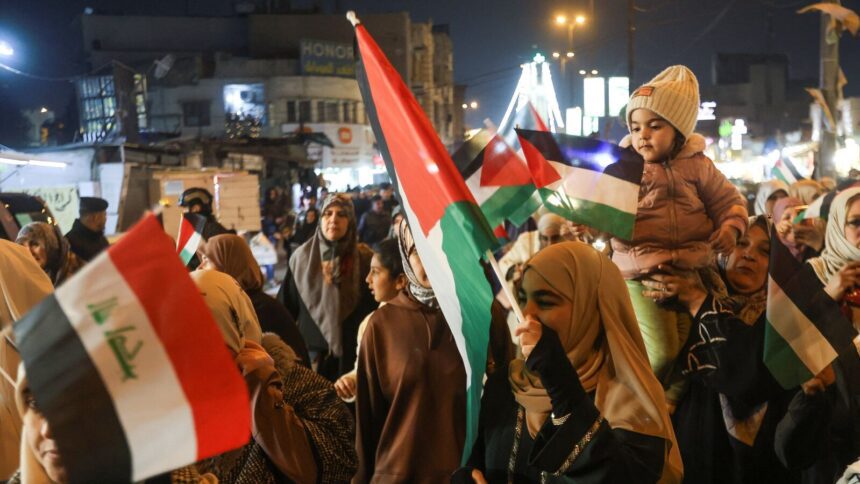The Turbulent Landscape of Iraq Amidst Regional Tensions: An In-Depth Analysis
Recent developments in the Middle East have brought Iraq back into the spotlight, highlighting its precarious position amidst escalating tensions between Israel and Iran. Since the onset of conflicts and shifts in alliances, Iraq has been thrust into a complex web of regional dynamics that poses significant challenges for its stability and sovereignty.
Background: Iraq’s Strategic Importance
Iraq’s geographical positioning as a neighbor to both Iran and Israel places it at the center of a long-standing regional rivalry. Since the U.S.-led invasion in 2003, Iraq’s political landscape has been heavily influenced by Iranian interests, particularly through the establishment of Shia militias. These groups, supported by Iran, have gradually become integral to Iraq’s security apparatus, complicating its pursuit of independent foreign policy.
Recent Developments
The situation escalated dramatically on November 8, 2023, when the Iranian-backed militia, al-Nujaba, launched drone attacks against Israel. This marked a stark reminder of how proxy conflicts could engulf Iraq, despite its efforts to distance itself from such regional skirmishes. While Iran continues to supply military resources and bolster militia capabilities, Iraq is attempting to maintain a neutral stance. Key Iraqi leaders, including Prime Minister Muhammad al-Sudani, have engaged in diplomatic dialogues with regional powers to de-escalate tensions and protect Iraq’s sovereignty.
Iran’s Influence and Iraq’s Dilemma
Iran wields significant influence in Iraq through various Shia factions, many of which have significant political power. The Popular Mobilisation Force (PMF), a coalition of militias, was formally integrated into the Iraqi state’s military framework after being formed in the wake of the Islamic State’s rise. However, some factions, like al-Nujaba, remain directly under Iranian control, complicating Iraq’s political landscape and raising concerns about Iranian interference in its internal affairs.
Despite preferring to avoid direct confrontations, Baghdad’s leaders are aware that any escalation by Iranian proxies could lead to retaliatory actions from Israel, further jeopardizing Iraq’s stability. Iran’s growing frustration with Israel’s military actions, particularly its use of Iraqi airspace for strikes against Iranian assets, places Iraq in an undesirable position as it seeks to mediate between its ally and its adversary.
The Road Ahead: Balancing Act Between Powers
As Iraq grapples with its internal challenges, including sectarian divisions and economic difficulties, its leaders recognize the urgent need for diplomatic strategies to safeguard national interests. Following the airstrikes in November, Iraqi officials reached out to Iranian leaders to dissuade them from involving Iraq in retaliatory strikes against Israel. Simultaneously, efforts to foster dialogue with Saudi Arabia reflect Iraq’s desire to foster relationships that could help it break free from Iranian domination.
The U.S. Factor
The role of the United States remains critical in the backdrop of Iraq’s efforts to navigate these treacherous waters. Recent U.S. strikes against Iranian-backed militias in Syria underscore America’s continuing strategy to counter Iranian influence in the region. The potential return of Donald Trump to the presidency could result in a more aggressive U.S. approach, which might include sanctions aimed at Iraq, adding another layer of urgency to Baghdad’s diplomatic maneuvers.
Conclusion: A Fragile Balance
The future of Iraq hangs in a delicate balance, as its leaders attempt to navigate the shifting allegiances and animosities of regional powers. While Iraq’s attempts at preserving sovereignty and diplomatic relations are crucial, the potential for violence stemming from external influences remains a significant concern. As Israel continues its campaign against Iranian influence and Iraq’s militias remain volatile, the prospect of Iraq being inadvertently drawn into a larger conflict poses a real danger.
In the context of these developments, it is imperative for Iraq to strengthen its political framework, reinforce its sovereignty, and engage in diplomatic efforts that can mitigate the risks posed by foreign interventions. The repercussions of regional conflicts will be felt far beyond the borders of Iraq, and its leaders must chart a careful course to ensure a stable future for the nation amidst the chaos surrounding it.










